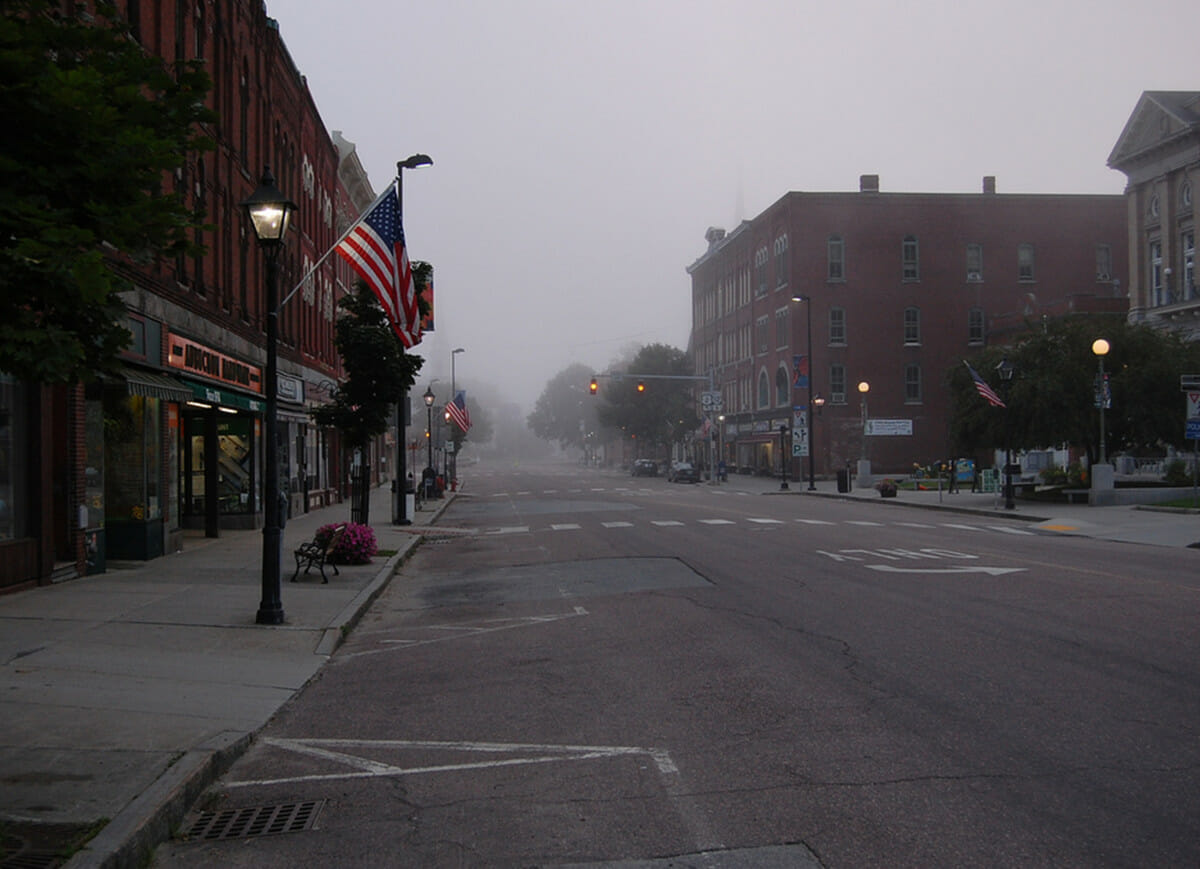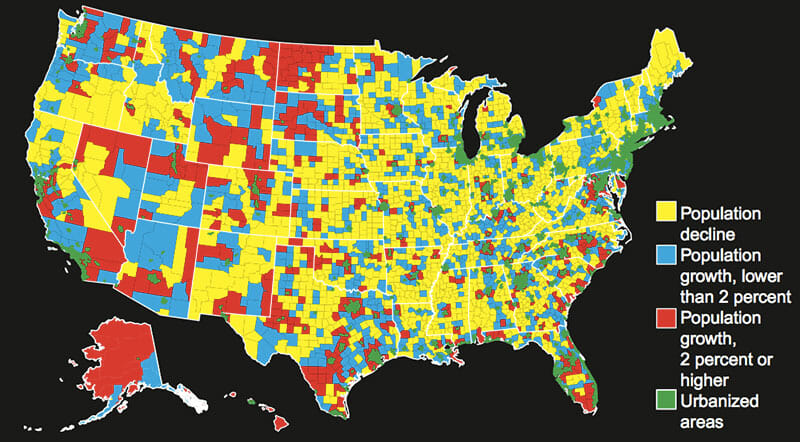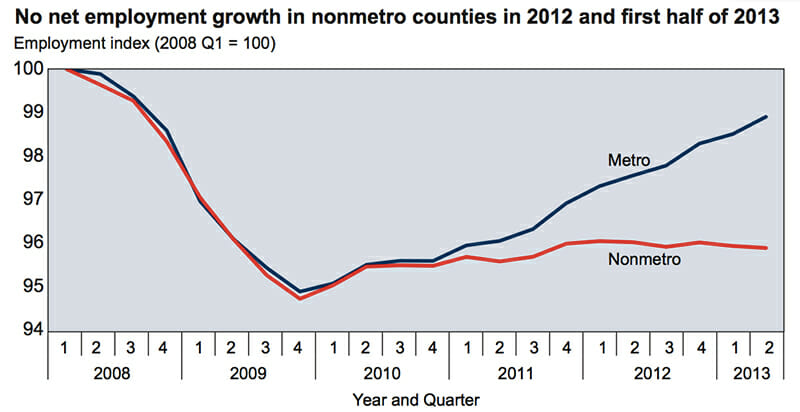Is the Economic Recovery Leaving Rural America Behind?
The shifts in our economy are changing the urban/rural divide from a tenuous line to what increasingly feels like an unbridgeable chasm.
Is the Economic Recovery Leaving Rural America Behind?
The shifts in our economy are changing the urban/rural divide from a tenuous line to what increasingly feels like an unbridgeable chasm.

But urbanites shouldn’t rejoice; a widening gulf between rural and urban America isn’t good for anybody.
That is because city dwellers and country bumpkins need each other, even if at times both sides may hate to admit it. Cities rely on the hinterland for resources and food just as most rural countries count on cities for tax subsidies and buying power.
But the shifts in our economy are changing the urban/rural divide from a tenuous line to what increasingly feels like an unbridgeable chasm.
The most surprising statistic in the report is the sudden population loss in rural areas. Between April 2010 and July 2012, almost 44,000 people left non-metro counties. While that might sound small, it marks a significant shift from population growth in rural America prior to the recession. Such a loss comes with many unwanted side effects, including a reduced demand for jobs, lower wages and higher per capita costs for providing social services to rural communities.

Explaining the trouble varies from county to county, but one major factor the report cites is the decline in manufacturing jobs. Not surprisingly, urban centers tend to specialize in knowledge-based work, packing in scientists, engineers and executives. Rural America has more openings for machinists and makers. Not only have these hands-on jobs been lost to foreign countries and technical changes, but they also tend to pay less than desk jobs.
In a press statement released last month, U.S. Agriculture Secretary Tom Vilsack called the report, “one more reminder that we need a national commitment to create new opportunities in rural America that keeps folks in small towns and reignites economic growth across the nation.” He noted the farm bill could be just such a ticket. Unfortunately, the bill remains locked in Congress between squabbling legislators and agricultural interest groups.

Not all of rural America is seeing tough times. Thanks to the oil boom on the Great Plains, some counties that once fretted over population drains now offer $300 signing bonuses to fast food employees and $50,000 a year salaries to gas station attendants.
Even so, the modern gold rush has also brought new problems. A study by officials in Montana and North Dakota found a 32 percent increase in crime for communities at the center of the boom.
Already, the division between urban and rural America has pushed parts of Colorado, Michigan, Maryland and California to consider becoming their own states. Like real divorce, political break ups require a few more hurdles than a simple yes/no vote (and, just to note, rural counties mostly voted “no” last November).
Then again, rural counties hoping to succeed should be a wake up call for city folk: Rural America is fed up with the lack of opportunity.
Follow us

This work is licensed under a Creative Commons Attribution-NoDerivatives 4.0 International License.
Want to republish a Modern Farmer story?
We are happy for Modern Farmer stories to be shared, and encourage you to republish our articles for your audience. When doing so, we ask that you follow these guidelines:
Please credit us and our writers
For the author byline, please use “Author Name, Modern Farmer.” At the top of our stories, if on the web, please include this text and link: “This story was originally published by Modern Farmer.”
Please make sure to include a link back to either our home page or the article URL.
At the bottom of the story, please include the following text:
“Modern Farmer is a nonprofit initiative dedicated to raising awareness and catalyzing action at the intersection of food, agriculture, and society. Read more at <link>Modern Farmer</link>.”
Use our widget
We’d like to be able to track our stories, so we ask that if you republish our content, you do so using our widget (located on the left hand side of the article). The HTML code has a built-in tracker that tells us the data and domain where the story was published, as well as view counts.
Check the image requirements
It’s your responsibility to confirm you're licensed to republish images in our articles. Some images, such as those from commercial providers, don't allow their images to be republished without permission or payment. Copyright terms are generally listed in the image caption and attribution. You are welcome to omit our images or substitute with your own. Charts and interactive graphics follow the same rules.
Don’t change too much. Or, ask us first.
Articles must be republished in their entirety. It’s okay to change references to time (“today” to “yesterday”) or location (“Iowa City, IA” to “here”). But please keep everything else the same.
If you feel strongly that a more material edit needs to be made, get in touch with us at [email protected]. We’re happy to discuss it with the original author, but we must have prior approval for changes before publication.
Special cases
Extracts. You may run the first few lines or paragraphs of the article and then say: “Read the full article at Modern Farmer” with a link back to the original article.
Quotes. You may quote authors provided you include a link back to the article URL.
Translations. These require writer approval. To inquire about translation of a Modern Farmer article, contact us at [email protected]
Signed consent / copyright release forms. These are not required, provided you are following these guidelines.
Print. Articles can be republished in print under these same rules, with the exception that you do not need to include the links.
Tag us
When sharing the story on social media, please tag us using the following: - Twitter (@ModFarm) - Facebook (@ModernFarmerMedia) - Instagram (@modfarm)
Use our content respectfully
Modern Farmer is a nonprofit and as such we share our content for free and in good faith in order to reach new audiences. Respectfully,
No selling ads against our stories. It’s okay to put our stories on pages with ads.
Don’t republish our material wholesale, or automatically; you need to select stories to be republished individually.
You have no rights to sell, license, syndicate, or otherwise represent yourself as the authorized owner of our material to any third parties. This means that you cannot actively publish or submit our work for syndication to third party platforms or apps like Apple News or Google News. We understand that publishers cannot fully control when certain third parties automatically summarize or crawl content from publishers’ own sites.
Keep in touch
We want to hear from you if you love Modern Farmer content, have a collaboration idea, or anything else to share. As a nonprofit outlet, we work in service of our community and are always open to comments, feedback, and ideas. Contact us at [email protected].by Sam Brasch, Modern Farmer
December 5, 2013
Modern Farmer Weekly
Solutions Hub
Innovations, ideas and inspiration. Actionable solutions for a resilient food system.
ExploreExplore other topics
Share With Us
We want to hear from Modern Farmer readers who have thoughtful commentary, actionable solutions, or helpful ideas to share.
SubmitNecessary cookies are absolutely essential for the website to function properly. This category only includes cookies that ensures basic functionalities and security features of the website. These cookies do not store any personal information.
Any cookies that may not be particularly necessary for the website to function and are used specifically to collect user personal data via analytics, ads, other embedded contents are termed as non-necessary cookies.